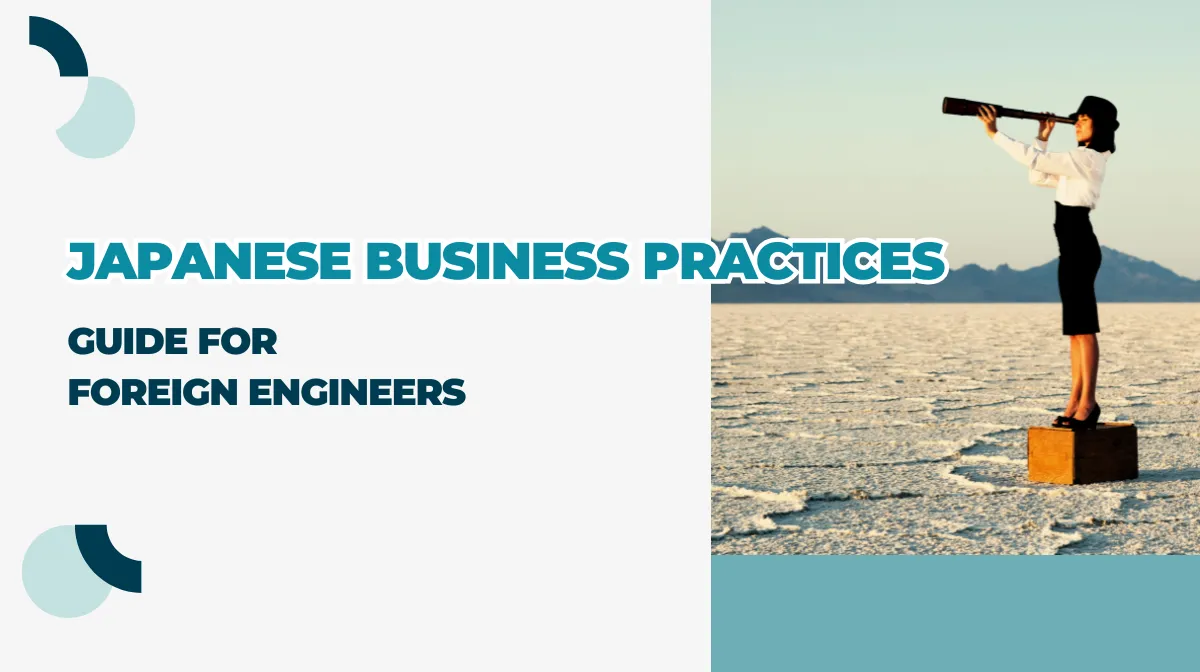As the number of foreign engineers working in Japan increases, understanding Japan’s unique business practices and corporate culture becomes increasingly important.
Understanding Japanese corporate characteristics such as collectivism, “ho-ren-so” (reporting-communicating-consulting), and the seniority system is key to smooth workplace adaptation and career development.
This article provides practical insights into the knowledge and mindset needed to succeed in Japanese companies.
1. Characteristics of Japanese Business Culture and Practices

“Business practices” refer to established ways of conducting commercial activities that have been deeply rooted in a country or region for a long time.
Here, we’ll explain the unique aspects of Japanese corporate culture and business practices.
Group-Oriented Mindset and Harmony Culture
Japanese people tend to emphasize group achievements over individual accomplishments when discussing success.
Modest behavior and speech are often appreciated. The concept of “wa(和)” (harmony), which emphasizes cooperation, is frequently referenced.
While these characteristics don’t apply to all Japanese companies or individuals, it’s helpful to recognize these tendencies. Understanding Japanese culture is the first step to adapting to it.
Lifetime Employment and Seniority System
Lifetime employment refers to the practice of companies employing individuals until their retirement age. The seniority system is a structure where longer-serving employees are more likely to receive promotions and wage increases.
While neither lifetime employment nor the seniority system is explicitly codified, these practices have been common in Japanese companies. However, both trends are declining compared to the past.
Decision-Making System
Group-oriented mindset, harmony consciousness, and seniority systems influence corporate decision-making.
For example, when general employees make proposals, they often need to create a ringi document and obtain approval from leaders, managers, and department heads before final decisions are made.
Additionally, before formal meetings, it’s common to practice “nemawashi” – consulting with stakeholders beforehand to gain their support.
2. Fundamentals of Japanese-Style Communication

Here, we’ll explain communication methods unique to Japanese companies.
Practicing Ho-Ren-So
In Japan, the practice of detailed reporting, communication, and consultation is called “ho-ren-so” and is highly valued.
While reporting frequency varies by workplace, daily progress reports are generally recommended, and immediate communication is expected when problems arise.
However, with the development of work-sharing systems and tools, ho-ren-so’s emphasis has somewhat decreased compared to the past.
Therefore, it’s important to confirm early on how much ho-ren-so is expected at your company.
Dealing with Implicit Understanding
In Japan, there are several “implicit understandings” that aren’t written in work rules or operation manuals.
Examples of implicit understanding
- It’s not preferred to leave work before your boss
- Arriving several minutes earlier than the designated meeting or work time
While these aren’t explicit rules, many people follow these customs.
However, these practices can vary by industry and company. Since these points can be difficult for foreigners to understand, it’s advisable to confirm them when joining a company.
Office Etiquette
Japanese offices have various behavioral norms
- Frequent bowing
- Saying “sumimasen” (excuse me) even when not at fault (such as when getting someone’s attention)
- Letting superiors and senior colleagues enter and exit elevators first
Since companies may have their own specific etiquette, it’s important to understand what your company values and ask for clarification if you encounter behaviors you don’t understand.
■日本でエンジニアとしてキャリアアップしたい方へ
海外エンジニア転職支援サービス『 Bloomtech Career 』にご相談ください。「英語OK」「ビザサポートあり」「高年収企業」など、外国人エンジニア向けの求人を多数掲載。専任のキャリアアドバイザーが、あなたのスキル・希望に合った最適な日本企業をご紹介します。
▼簡単・無料!30秒で登録完了!まずはお気軽にご連絡ください!
Bloomtech Careerに無料相談してみる
3. Project Participation Guidelines

Since engineering work often involves projects, let’s understand the essential knowledge for project participation.
Understanding Project Structure
When assigned to a project, start by grasping the project’s purpose and specifications. It’s also essential to review any relevant past documentation.
Additionally, after understanding your assigned role, it’s important to address any skill gaps early.
Meetings and Communication
Good communication with project members makes it easier to gather necessary information and seek help when needed. Therefore, try to participate in meetings as much as possible to maintain communication.
Active participation in meetings is encouraged. Even if you don’t have specific points to discuss, engaging in casual conversation can be beneficial.
Particularly when there are few foreigners among a group of Japanese people, unconscious barriers might form. Since it’s easier to initiate dialogue through greetings and self-introductions when first meeting, try to establish friendly relationships before barriers develop.
Technical Proposals and Implementation
Technical proposals are essential documents for securing projects, as they outline how to technically solve clients’ problems and challenges.
When creating proposals, it’s important to clearly specify problem-solving methods and implementation outcomes. Additionally, focus on highlighting your company’s technical strengths and creating content that’s easily understandable for clients.
4. Evaluation Systems and Promotion Mechanisms

Corporate evaluation systems and promotion mechanisms vary by country and culture. For those coming to work in Japan from other countries, understanding Japanese evaluation and promotion systems directly impacts income growth and career development.
Here, we’ll explain how Japanese companies handle evaluations and promotions.
Evaluation System
Japanese companies primarily evaluate personnel based on these three aspects
Capability Assessment While technical skills are emphasized for engineers, planning ability, trouble-shooting capabilities, communication skills, crisis management abilities, and leadership skills are also evaluated.
Performance Assessment Contributions to sales, profits, and completed work volume are evaluated. Achievement of predetermined goals within specific periods is also an important evaluation criterion. Other factors like the number of proposals submitted and efforts toward cost reduction are also considered.
Attitude Assessment Work attitude and motivation are evaluated. Cooperation, proactiveness, sense of responsibility, and rule compliance are all considered.
Regarding promotions, while skills and performance are evaluated, seniority considerations may also influence decisions.
For example, when skill levels and performance contributions are similar, those with longer tenure tend to be promoted first.
Career Path Design
While career path design is crucial for all engineers, it’s particularly significant for foreign workers.
Depending on visa type, the ability to secure stable work can affect visa renewal for some individuals.
Additionally, among foreign workers, some plan to stay in Japan permanently while others intend to eventually return to their home countries.
Either way, career advancement strengthens your professional position. Therefore, it’s recommended to design your career path early and work toward your goals.
Diversifying IT Engineer Career Paths
Recently, IT engineer career paths have become highly diverse. Options include consulting, quality assurance, system integration, system auditing, and more.
Some work as in-house system engineers for a single company, while others become entrepreneurs. Regardless of direction, it’s important to understand your inclinations and aptitudes, define your career goals, and plan feasible routes to achieve them.
Utilizing Evaluation Interviews
Typically, Japanese companies conduct personnel evaluations, including interviews. Take advantage of these opportunities to actively seek feedback about your skills and performance.
For foreigners unfamiliar with Japanese culture, it can be difficult to recognize necessary improvements or requirements for success in Japanese companies.
Therefore, make the most of supervisor interviews to gain valuable feedback.
If Considering Career Advancement Through Job Change
However, if you’re considering career advancement through changing jobs, it’s generally better not to discuss these plans with your current supervisor.
Supervisors are more motivated to advise those planning to stay with the company rather than those planning to leave.
Additionally, if your job search becomes known to your supervisor, you might receive fewer important assignments, and if moving to a competitor, there’s a risk your resignation might not be accepted.
While workers have the freedom to change jobs, you might work with your former company in the future, especially in small industries, so aim for an amicable departure.
■日本でエンジニアとしてキャリアアップしたい方へ
海外エンジニア転職支援サービス『 Bloomtech Career 』にご相談ください。「英語OK」「ビザサポートあり」「高年収企業」など、外国人エンジニア向けの求人を多数掲載。専任のキャリアアドバイザーが、あなたのスキル・希望に合った最適な日本企業をご紹介します。
▼簡単・無料!30秒で登録完了!まずはお気軽にご連絡ください!
Bloomtech Careerに無料相談してみる
5. How to Handle Difficulties

When working in an unfamiliar country, problems can arise from language and cultural differences. Here’s how to handle issues while working in Japan.
Dealing with Cultural Conflicts
When conflicts or problems arise from cultural differences, start by explaining there was no ill intent and discuss the matter calmly.
Asserting “I’m right” is counterproductive. Once a problem occurs, you may have caused some misunderstanding, discomfort, or harm to the other party.
Conversely, even if you’ve been hurt, it might have occurred because the other party was unfamiliar with your culture.
First, clarify what misunderstandings occurred and try to find a mutually satisfactory resolution.
Finding Common Ground
When people from different cultures and customs work together, a relationship where one side constantly compromises won’t last. Therefore, it’s important to find points where both parties can meet halfway.
Also, to prevent similar problems from recurring, clearly identify what was unknown about each other’s cultures and discuss how to avoid future conflicts.
Handling Work-Related Issues
There are many types of work-related problems. For misunderstandings arising from language or cultural barriers, refer to the previous “Dealing with Cultural Conflicts” section.
However, if problems are serious and might lead to employment termination or compensation claims, resolution between parties might not be sufficient. It’s recommended to check available consultation services for foreigners in preparation for such situations.
It’s helpful to be familiar with resources like the Ministry of Health, Labour and Welfare’s website, which provides consultation services for foreigners.
Stress Management and Consultation
When working in another country, stress can accumulate due to differences in language, culture, religious views, and dietary habits.
Since neglecting stress can lead to physical and mental health issues, incorporate stress-relief methods into your daily life. Adequate sleep and rest are crucial for stress management.
It’s important to find stress-relief methods that suit you and are easy to implement
- Moderate exercise
- Listening to music
- Dining out
- Short trips
- Conversations with family and friends
6. Path to Long-Term Success in Japan

Here, we’ll explain key points for achieving long-term success as an engineer in Japan.
Leadership Development
Leadership development involves cultivating the ability to guide organizations toward their goals.
Having leadership skills as an engineer can open paths to positions like project manager. Therefore, actively developing leadership skills and problem-solving abilities is recommended.
Enhancing Expertise
To succeed as an engineer, continuous improvement of skills and expertise is essential. Engineering knowledge and technology are broad and rapidly evolving.
Therefore, it’s important not to become complacent after mastering certain technologies and to stay aware of new developments. Specifically, actively participating in study groups and seminars, and pursuing certifications are recommended.
Building Career Networks
A career network consists of professional connections with people, companies, and organizations built throughout your career.
Building a broad network is crucial for engineers, and it’s possible to establish global career networks.
Creating your own career network can lead to increased income, social status establishment, and achieving satisfying work styles.
7. Understanding Japanese Business Practices Leads to Career Growth
Success in Japanese companies requires not only technical skills but also understanding of culture and customs. While Japanese business practices may seem complex at first, understanding their background enables appropriate responses.
By positively embracing cultural differences and deepening communication while building your career, you can enhance your value as a global engineer.

















